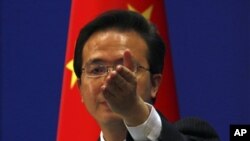China says sanctions will not "fundamentally" resolve international concerns about Iran's nuclear program.
Foreign ministry spokesman Hong Lei made the comments Thursday, a day after several Western powers said Tehran could face additional penalties if it refuses to cooperate with U.N. nuclear inspectors. The spokesman said Beijing favors dialogue.
Britain, France and Germany raised the possibility of additional U.N. sanctions after the International Atomic Energy Agency, IAEA, released a report saying it has "credible" evidence of Iranian efforts to design a nuclear weapon.
In its report, released Tuesday, the IAEA expressed "serious concern" about Iran's nuclear program, saying that although some of its components can have civilian applications, others are linked to nuclear weapons.
Western powers say they want to prevent Iran from becoming nuclear-armed, but Tehran insists its nuclear program is peaceful.
The U.N. Security Council has already passed four sets of sanctions on Iran. Two permanent members of the council, China and Russia, have so far shown little willingness to impose more.
Russian Deputy Foreign Minister Gennady Gatilov told the Interfax news agency on Wednesday that Moscow believes new sanctions will be seen in the international community as a pretext to try to pursue "regime change" in Iran.
In another development, Iran issued a new warning on Thursday against any attacks on its nuclear sites. Supreme Leader Ayatollah Ali Khamenei said Iran would respond with full force to any such attacks, especially from Israel or the United States.
Last week, Israeli President Shimon Peres said an attack on Iran was becoming "more and more likely."
Some information for this report was provided by AFP and Reuters.












